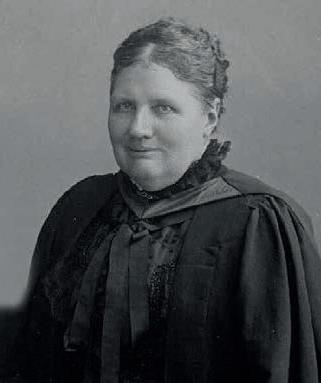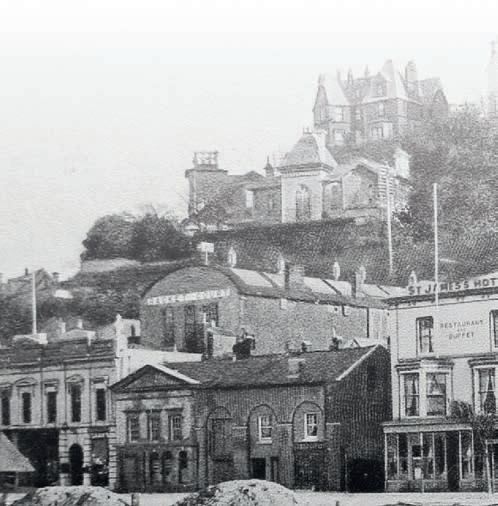
5 minute read
Local man prepares for UK circumnavigation
Dame Agnes Elizabeth Weston
Agnes Weston was a Christian lady who created hugely popular Sailors’ Rests; one of these was located on Victoria Parade in Torquay. Torbay Civic Society Chairman, Ian Handford tells us more.
Advertisement
Born in London on March 26th 1840 Agnes Elizabeth Weston was a daughter of barrister Charles Henry Weston. She moved with her family from London to Bath in 1845 and here she enjoyed a private education. From an early age Agnes (now known as Aggie) was religious, perhaps due to the in uence of Reverend J Fleming, Curate of St Stephens in Bath. She adored writing, riding and swimming and, in mirroring her father, also enjoyed astronomy and geology. Becoming an independent young woman without money worries, marriage was never a priority. Living in a happy, loving and successful environment Aggie spent her early years undertaking Christian activities including teaching. On Sundays she played the organ, having been tutored at Gloucester Cathedral.
With her sister, she became an active member of the Temperance Movement in support of local clergy. In time, the girls opened a small shop in Bath, which became a co ee bar to meet the needs of the Somerset Militia in the city. e family nanced the project and now the troops would enjoy access to board games, a writing room and have free light refreshment. Organised Christian meetings were held at the centre and though everything was nonpro t-making, it was not long before Aggie realised that a small charge ought to be made, as nothing of any value comes absolutely free. It was a rst business lesson.
But now local critics including Army o cers went public, stating that soldiers might get ideas “above their station” having access to writing. e girls also had their detractors. is was an era when women were not expected to have a career and soon the girls’ parents were approached, “it was not right - unmarried girls should not mix with soldiers” - even if doing good works. Marriage was a woman’s role in life. However, the critics were silenced when the business prospered.
It was clear to Aggie that many soldiers were lonely and frightened of returning to duty, mainly because they had no one at home with whom to correspond. She might ful l that role; if a soldier wished to write or needed a letter that was ne - she could help. In time, the letter service bene ted thousands of men and became an absolute saviour. One soldier on board a ship bound for India, explaining the idea to a sailor was asked, “You redcoats seem to have kind friends….do you think the lady would write to me?” e soldier replied, “I am sure she would - if she writes to redcoats - why not bluejackets?” ousands of letters to and from sailors at sea were sent during the 1860s con rming the need for such a service. Aggie now created a monthly newsletter titled ‘Ashore & A oat’, and this still survives, although it is now a bi-monthly publication. She edited the magazine for 45 years, while also addressing public meetings and visiting families of naval establishments. Eventually having left Bath for Plymouth she went to live with the Wintz family in Devonport. After joining the Royal Naval Temperance Society in 1873 she received a delegation from the Petty O cer and members of HMS Dryad in Devonport. ey wanted her to set up a centre for ‘blue-jackets’ at the dockyard gates. Aggie was initially hesitant but when Sophie, daughter of the Wintz family o ered help, she decided to proceed.
Dozens of meetings were held in Devon by Aggie to establish the necessary funds to create a Temperance Centre. It mirrored the one in Bath but being at Devonport was soon renamed the ‘Sailors Rest’. It was a true meeting place, which developed into a hostel-institution, a home-from-home where sailors might take meals in quiet relaxation, with or without family or friends. Aggie next devised a savings club for sailors. is became so popular that she had to plead with the Admiralty to take automatic
deductions from Naval pay, making it more e cient. With Accompanied by Sophie, she remarked that it was the most her Plymouth ‘Rest’ established by 1878 she then created wonderful achievement of her life. A year later she opened a ‘Portsmouth Rest’ after hearing of the loss of 320 men Torquay’s Sailors’ Rest in Victoria Parade. Finally in 1918 when HMS Eurydice sank. she received another award - King Edward VII made her
Never fearful of venturing outside after dark, Aggie Dame Grand Cross of the Order of the British Empire often went out, dressed in “bonnet and cape”, to assist (GBE). Sadly, Dame Agnes was too unwell to attend the drunken lads on the street, rather than leaving them to o cial ceremony. o cial patrols. She remarked, “ ey are after all some Having su ered a heart attack on October 23rd mothers’ sons”. However, ‘ladies of the street’ took a dim 1918 with Sophie at her side at RSR Devonport Aggie view, as their potential clients were being removed. Some murmured quietly, “Don’t trouble about me, I’m all right” prostitutes even threw mud or stones when Aggie passed before dying aged 78. Honoured as the rst woman ever by but fortunately the police kept an eye open for such given a full ceremonial Royal Navy funeral, she was buried activity. One story tells at the Dockyard Chapel of her return to the ‘Rest’ with some sailors, only to be met by the watchman saying, “Careful how you “ Never fearful of venturing outside after dark, Aggie often went out, dressed in “bonnet and cape”, to assist drunken lads on the street, rather than leaving in West Mill Devonport. Sophie would continue to oversee the RSRs until her death in 1929. open the door lady, we’ve them to o cial patrols. e two ladies were got another dozen waiting buried together under here”. Records con rm a magni cent statue in one year 378,375 sailors sought refuge in Aggie and at Weston Mill Cemetery Devonport. e charity Aggie Sophie’s rests. Weston’s (known as Aggie’s) is still active across the country.
Having attended the Royal Naval Exhibition at Chelsea Today all RSRs have chaplaincy support to help the daily Hospital in 1892, Aggie dreamt of establishing a widows’ workload while the organisation’s ‘Ashore and A oat’ pension scheme and eventually after two years civil servants publication sails on. aggies.org.uk at Whitehall adopted the idea. All serving personnel torbaycivicsociety.co.uk became eligible to join the new pension scheme after which Aggie was awarded a Royal Warrant. She renamed her businesses ‘Royal Sailors Rests’ (RSR) - still used today.
Aggie became one of the rst women to get an The Sailors’ Rest on Honorary Doctorate Law Degree from Glasgow in 1901. Vaughan Parade













